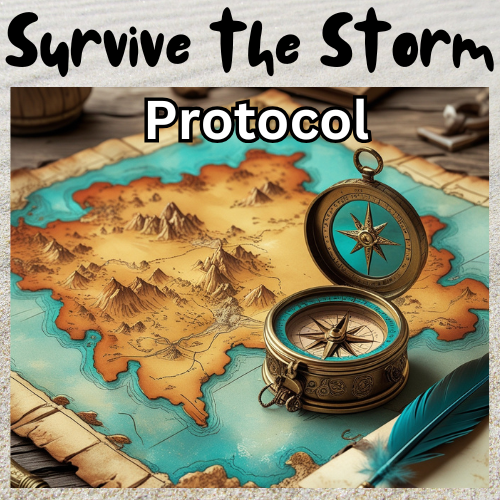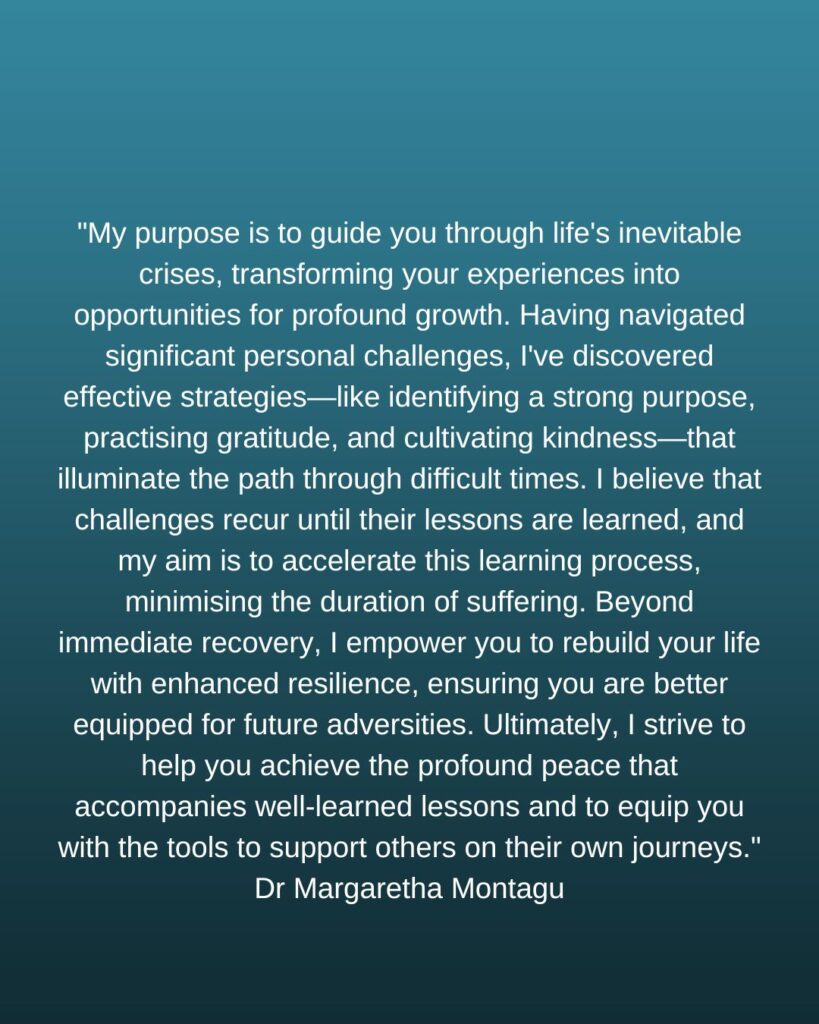How Small Acts of Kindness Create Ripple Effects That Transform Communities
Those of you who know me personally, especially those of you who have attended one of my Camino de Santiago walking retreats, probably know that Gratitude and Generosity are two of my prime values, as I keep harping on about it at every opportunity.
I think I’ve more or less mastered gratitude as a practice now, and it has enriched my life thousandfold. Mastering generosity…well, let’s just say I’m still, after all these years, at most at an intermediate level, mastery remaining elusive despite my determined attempts.

So I have decided to grab the proverbial bull by the horns and start a charity called Sauvetage et Sérénité that provides lifelong sanctuary for abandoned and abused horses while offering healing through equine-assisted therapy for people facing life’s toughest challenges.
I did some research about what motivates people to be generous, and I discovered a treasure chest of talks about the subject, which inspired me to write a series of articles on the subject, starting with Chris Anderson’s “Infectious Generosity” TED talk.
Summary
In a world increasingly divided by digital connections and social isolation, Chris Anderson, the visionary head of TED, presents a revolutionary concept that could reshape how we navigate life’s most challenging moments. Infectious Generosity isn’t just about giving money or volunteering time/energy/skills—it’s about creating chain reactions of kindness that spread across communities, transforming individual struggles into collective wellbeing. This movement harnesses the very same digital platforms that often divide us, turning them into powerful forces for connection. When life delivers its inevitable lifequakes—job loss, illness, relationship breakdown—infectious generosity creates networks of resilience that catch us when we fall and lift us when we’re ready to rise again.
Ripple Effect
Susan Martinez never expected her life to crumble on a Tuesday morning in mid-March. The email was brief, clinical: “Due to organisational restructuring, your position has been eliminated.” After fifteen years as a marketing director, she was suddenly unemployed, with two children to support and a super-sized mortgage.
What happened next would change not just Susan’s life, but the lives of hundreds of people she’d never met.
Instead of retreating into shame and isolation—the natural response many of us have to personal catastrophe—Sarah did something unexpected. She posted honestly about her situation on LinkedIn, not asking for help, but simply sharing her story. “Today I learned what vulnerability is,” she wrote. “I’m scared witless, but I won’t give in and I won’t ever give up.”
The response was immediate and overwhelming. Former colleagues shared job leads. Strangers offered to review her resume. A small business owner in another state, inspired by Susan’s honesty, decided to finally post about her own struggles with mental health during the pandemic. That post inspired a therapist to offer free sessions to entrepreneurs. The therapist’s generosity moved a local business group to create a support fund for community members facing unexpected hardships.
Within six weeks, Susan had not only found a new job but had inadvertently sparked a movement in her community. The ripple effects of her initial act of vulnerably sharing her precarious situation had created a network of support that helped dozens of people through their own lifequakes. This is infectious generosity in action—the transformative power of small acts that spread like wildfire, creating change at a scale never experienced before.
Understanding Infectious Generosity: More Than Just Being Kind
At its broadest, infectious generosity is “any generous act that sparks someone else to be generous,” according to Chris Anderson. But this simple definition belies the profound implications of what happens when generosity becomes contagious in our hyperconnected world.
Traditional generosity operates in a linear fashion: you give something to someone, and that’s the end of the transaction. Infectious generosity, however, creates exponential impact. It’s “the idea that through the power of the internet, small acts of thoughtfulness spread to change lives at a scale never seen before.”
This concept emerges from Anderson’s decades of experience curating TED Talks, where he’s witnessed firsthand how ideas can spread virally when they resonate with human truth. He realised that generosity, like ideas, has the potential to become contagious when amplified by digital connectivity and human psychology.
The mechanics of infectious generosity work on three fundamental levels:
Visibility: Unlike traditional acts of kindness that often happen in private, digital platforms make generosity visible to vast networks of people. When we see others being generous, it triggers our own generous impulses—a phenomenon psychologists call “moral elevation.”
Amplification: Social media and digital communication tools don’t just make generosity visible; they amplify its reach exponentially. A single act of kindness can be seen, shared, and replicated by thousands of people across geographical and cultural boundaries.
Inspiration: Perhaps most importantly, visible acts of generosity inspire others not just to reciprocate, but to initiate their own generous acts. This creates a multiplicative effect where generosity breeds more generosity, creating ever-expanding circles of positive impact.
LifeQuakes: When the Ground Beneath Us Shifts
Life has a way of delivering lifequakes when we least expect them. Unlike geological earthquakes, life quakes are the sudden, disruptive events that shake the foundation of our existence: unexpected job loss, serious illness, relationship breakdown, financial crisis, or the death of a loved one. These events leave us feeling isolated, overwhelmed, and often ashamed—emotions that drive us toward isolation precisely when we most need connection.
In previous generations, communities were geographically bound and socially tight-knit. When someone faced a crisis, neighbours, extended family, and local institutions naturally rallied around them. But modern life has fractured many of these traditional support systems. We’re more mobile, more independent, and paradoxically, more isolated despite being more connected than ever before.
This is where infectious generosity becomes not just helpful, but life-changing, not just for one person, but for a whole community. It rebuilds the support networks that modern life has eroded, but does so at a scale and speed that traditional communities could never achieve.
The Science Behind the Spread
The power of infectious generosity isn’t just philosophical—it’s backed by solid psychological and sociological research. Scientists have identified several key mechanisms that make generosity genuinely contagious:
Mirror Neurons: Our brains are wired to mirror the behaviours we observe in others. When we witness acts of generosity, our mirror neurons fire as if we were performing the generous act ourselves, priming us to behave generously.
Social Proof: Humans are social creatures who look to others for cues about appropriate behaviour. When generosity becomes visible and celebrated in a community, it establishes new social norms that encourage more generous behaviour.
Positive Emotions: Generous acts trigger the release of oxytocin, dopamine, and endorphins—chemicals that create feelings of connection, pleasure, and well-being. These positive emotions are contagious; when people feel good, they’re more likely to create good feelings in others.
Reciprocity: The principle of reciprocity is deeply embedded in human psychology. When someone receives generosity, they feel compelled not just to return that generosity to the giver, but to “pay it forward” to others.
Moral Elevation: Witnessing acts of virtue and kindness creates a specific emotional response—a warm, uplifting feeling that motivates us to become better people and perform virtuous acts ourselves.
Digital Platforms: Accelerants of Generosity
What makes infectious generosity particularly powerful in our current era is how digital platforms can amplify and accelerate these natural human tendencies. Social media, crowdfunding platforms, and digital communication tools serve as force multipliers for generous acts.
Consider how a simple act of generosity can now spread:
A teacher creates a classroom supply fund for students whose families are struggling financially. She shares the fund on social media. A friend shares it with her network. Someone in that network is inspired to create a similar fund in their community. A local business owner sees the post and decides to sponsor supplies for an entire school. The story gets picked up by local news, inspiring other businesses to get involved. Within weeks, what started as one teacher’s small act of generosity has mobilized an entire community and created sustainable support systems for hundreds of children.
This amplification effect is what transforms individual acts of kindness into community-wide movements. Anderson encourages all of us to “harness the internet as a force that brings people together instead of driving them apart.”
Infectious Generosity: No Money Involved
One of the most powerful aspects of infectious generosity is that it doesn’t require wealth or significant resources. We can be generous financially, but we can also “share time, knowledge, attention, skills and more.” This accessibility makes infectious generosity truly democratic—anyone can participate and make a meaningful impact.
Knowledge Generosity: Sharing expertise, skills, or information that helps others solve problems or advance their goals. This might be a professional offering free mentorship, a skilled craftsperson teaching their trade, or someone sharing hard-won life lessons through storytelling.
Attention Generosity: In our distracted, overwhelmed world, giving someone your full attention is increasingly rare and valuable. This includes active listening, providing emotional support, or simply being present for someone who needs connection.
Platform Generosity: Using your social media presence, professional network, or community connections to amplify others’ messages, causes, or needs. This form of generosity leverages influence rather than money.
Time Generosity: Volunteering your time and energy to causes or people who need support. This is perhaps the most traditional form of generosity, but digital platforms can make it more organised and impactful.
Skill Generosity: Offering your professional or personal skills to help others. This might include pro bono professional services, helping someone with technology, or teaching a skill that could improve someone’s life or career prospects.
Opportunity Generosity: Creating or sharing opportunities with others—job leads, introductions, invitations to events, or access to resources that might otherwise be unavailable.
Emotional Generosity: Offering encouragement, celebration, empathy, and emotional support. This includes congratulating others’ successes, acknowledging their struggles, and providing hope during difficult times.
Case Studies in Viral Kindness
The power of infectious generosity becomes clear when we examine real-world examples of how small acts have created massive positive change:
The Ice Bucket Challenge: What began as a simple challenge to raise awareness for ALS became a global phenomenon that raised over $115 million for research and dramatically increased public awareness of the disease. The campaign’s success came from its infectious nature—people didn’t just donate, they challenged others to participate, creating exponential growth.
Random Acts of Pizza: Started as a simple subreddit where people could request pizza during tough times, this community has delivered thousands of pizzas to people in need around the world. More importantly, it’s inspired countless other “random acts” communities focused on everything from sending Christmas cards to elderly people to providing school supplies for teachers.
Pay It Forward Movements: Coffee shops and restaurants around the world have experienced “pay it forward” chains where customers pay for the orders of strangers behind them in line. These chains sometimes last for hours or even days, spreading joy and connection throughout communities.
Mutual Aid Networks: During the COVID-19 pandemic, neighbours who had never spoken before organised through social media to deliver groceries to vulnerable community members, creating lasting networks of support that continue to this day.
Cultivating a Generous Mindset: The Foundation of Infectious Generosity
Creating infectious generosity begins with what Anderson calls cultivating a generous mindset. This isn’t about having more resources to give away; it’s about fundamentally shifting how we see ourselves in relationship to others and our communities.
A generous mindset starts with recognising our interconnectedness. When we understand that our well-being is intimately connected to the well-being of others, generosity stops feeling like a sacrifice and starts feeling like an investment in our shared future.
This mindset also involves shifting from scarcity thinking to abundance thinking. Scarcity thinking tells us that there isn’t enough to go around—not enough money, time, opportunities, or love. Abundance thinking recognises that many of the most valuable things we can share—knowledge, attention, encouragement, connection—actually multiply when we give them away.
Perhaps most importantly, a generous mindset requires us to see giving not as depleting our resources, but as creating wealth—wealth of connection, meaning, purpose, and community resilience.
The Therapeutic Power of Giving During Crisis
Research consistently shows that generous behaviour benefits the giver as much as the receiver, particularly during times of personal crisis. When we’re going through our own lifequakes, our natural tendency is to turn inward, to focus solely on our own pain and problems. While some degree of self-focus is necessary for healing, exclusive self-focus can actually perpetuate suffering.
Generous acts during a personal crisis serve several therapeutic functions:
Restoring Agency: Crisis often leaves us feeling powerless and out of control. Generous acts restore our sense of agency by allowing us to positively impact others’ lives, even when we can’t control our own circumstances.
Creating Meaning: Viktor Frankl observed that humans can endure almost any suffering if they can find meaning in it. Generous acts create meaning by transforming our pain into purpose, our struggle into service.
Building Connection: Crisis can be profoundly isolating. Generous acts create a connection with others, reminding us that we’re not alone and that our lives matter to other people.
Shifting Perspective: When we focus on helping others, we often gain perspective on our own problems. This doesn’t minimise our struggles, but it can help us see them in context and identify resources and resilience we didn’t know we had.
Activating Support: Paradoxically, when we give to others during our own difficult times, we often receive support in return. This isn’t about strategic manipulation, but about the natural human tendency to reciprocate kindness and help those who help others.
Overcoming Barriers to Generous Action
Despite the clear benefits of infectious generosity, many people hesitate to engage in generous acts. Understanding and addressing these barriers is crucial for creating a more generous world:
Fear of Vulnerability: Generosity requires vulnerability—we risk being taken advantage of, rejected, or judged. Building courage for vulnerability is essential for generous living.
Perfectionism: Many people hesitate to help because they worry their assistance won’t be perfect or sufficient. Infectious generosity teaches us that imperfect help is better than perfect inaction.
Resource Anxiety: People often believe they don’t have enough resources to make a difference. Infectious generosity shows us that everyone has something valuable to offer, even if it’s not money.
Cynicism: Past negative experiences or cultural messaging can make us cynical about generosity. Overcoming cynicism requires gradually rebuilding trust in human goodness through small, safe acts of giving.
Overwhelm: The scale of need in the world can feel overwhelming, leading to paralysis. Infectious generosity encourages us to start small and local, trusting that small acts can have large impacts.
Building Resilient Communities Through Generous Networks
When infectious generosity takes hold in a community, it creates something more valuable than individual acts of kindness—it builds resilient networks that can withstand and respond to collective challenges.
These networks operate on multiple levels:
Individual Resilience: People who are part of generous communities develop greater personal resilience because they know they have support systems to fall back on during difficult times.
Community Resilience: Communities with strong cultures of generosity can respond more effectively to crises because they have established networks of mutual aid and support.
Social Resilience: Societies with generous cultures are more cohesive, have greater social trust, and are better able to address collective challenges like natural disasters, economic downturns, or social upheaval.
The Ripple Effect: How Small Acts Create Massive Change
The true power of infectious generosity lies in its ability to create ripple effects that extend far beyond the initial act. These ripples operate on multiple timescales and scales:
Immediate Ripples: The direct impact on the recipient of a generous act, which often motivates them to be generous to others.
Social Ripples: Changes in social norms and expectations within communities as generous behaviour becomes more visible and celebrated.
Cultural Ripples: Long-term shifts in cultural values and practices as generous behaviour becomes embedded in institutions and traditions.
Systemic Ripples: Changes in systems and structures as generous approaches influence policy, business practices, and social institutions.
Understanding these ripple effects helps us appreciate why small acts of generosity can have such profound impacts. Every generous act is like dropping a stone in a pond—the ripples spread outward in ways we may never fully see or understand.
The Future of Infectious Generosity
As we look toward the future, infectious generosity offers a hopeful vision for addressing many of the challenges facing our world. Climate change, inequality, social isolation, mental health crises, and political polarisation are all challenges that require collective action and mutual support.
Infectious generosity doesn’t solve these problems directly, but it creates the social infrastructure necessary for addressing them effectively. When communities are connected by networks of mutual aid and support, they’re better positioned to tackle complex challenges together.
The technology that enables infectious generosity is still evolving. Artificial intelligence, virtual reality, blockchain technology, and other emerging tools will likely create new possibilities for connecting generous people with those who need support, making generous acts more efficient and impactful, and building stronger communities of mutual aid.
5 Key Takeaways
- Generosity is Contagious by Design: Human beings are psychologically wired to mirror generous behaviour. When we witness acts of kindness, our brains activate the same neural pathways as if we were performing the generous act ourselves, making us more likely to act generously toward others.
- Digital Platforms Amplify Impact: Modern technology transforms individual acts of kindness into community-wide movements. A single generous act shared online can inspire thousands of people across geographical boundaries, creating an exponential positive impact.
- Everyone Has Something Valuable to Give: Infectious generosity isn’t limited to those with financial resources. Knowledge, attention, skills, time, and emotional support are all forms of generosity that can create profound change in others’ lives.
- Generosity During Crisis Heals the Giver: When we’re going through personal difficulties, generous acts restore our sense of agency, create meaning from suffering, build connections with others, and often activate support networks that help us through our own challenges.
- Small Acts Create Massive Change: The ripple effects of generous behaviour extend far beyond the immediate recipient, influencing social norms, community resilience, and even systemic change over time. Every act of generosity, no matter how small, contributes to building a more connected and supportive world.
Frequently Asked Questions
Q: How is infectious generosity different from regular charity or volunteering?
A: While traditional charity and volunteering are valuable, infectious generosity focuses on creating viral chains of kindness that spread exponentially. The goal isn’t just to help one person or cause, but to inspire others to act generously, creating ripple effects that reach far beyond the original act. It’s about making generosity contagious rather than simply transactional.
Q: What if I don’t have money to give? Can I still participate in infectious generosity?
A: Absolutely. Infectious generosity encompasses many forms of giving beyond money: sharing knowledge or skills, offering emotional support, providing your time and attention, amplifying others’ messages through your social networks, or simply being present for someone who needs connection. Often, these non-monetary forms of generosity can be more impactful than financial donations.
Q: How do I know if my generous acts are actually “infectious” and inspiring others?
A: You may not always see the ripple effects of your generosity, and that’s normal. Sometimes the impact becomes visible through social media shares, thank-you messages, or seeing others perform similar acts. But often, the most profound impacts happen quietly and may not be visible to you. The key is to focus on authentic generosity rather than tracking its spread.
Q: What if I’m going through my own crisis? Should I still try to be generous to others?
A: Yes, but be gentle with yourself. Research shows that generous acts during personal crises can actually aid in healing by restoring your sense of agency, creating meaning from suffering, and building connections with others. However, start small and don’t overextend yourself. Even tiny acts of kindness—like sending an encouraging message or sharing someone’s post—can create positive ripples while supporting your own well-being.
Q: How can communities or organisations systematically foster infectious generosity?
A: Organizations can create cultures of infectious generosity by making generous acts visible (through recognition programs, storytelling, or social sharing), providing easy opportunities for people to help others, leading by example in leadership behavior, creating systems that support rather than compete with generous impulses, and celebrating and sharing stories of generosity to inspire others. The key is making generosity a visible, valued, and accessible part of the community culture.
In a world that feels increasingly unstable — politically, economically, emotionally — what will you do when the rug is pulled out from under you? That’s why I created Survive the Storm — a 7-part online course designed to be a lifeline during a life quake. This is your personal survival toolkit for uncertain times — lovingly crafted and packed with practical tools, emotional support, and soul-nourishing insights to help you stay grounded, resilient, and resourceful when everything around you feels like it’s falling apart. Enrol in How to Survive the Storm Protocol, with or without additional mentoring.

Get rid of the nagging emptiness of “Is this all there is?” and step into a life where your accomplishments feel as purposeful, meaningful and fulfilling as they are impressive. This unique mentoring program empowers you to unearth the mission that sets your soul on fire and aligns your life with what truly matters to you—beyond success metrics and societal expectations.


Author Bio: Dr Margaretha Montagu – described as a “game changer”, “gifted healer”, “guiding light” and “life-enriching author” – is an experienced medical doctor, a certified NLP practitioner, a medical hypnotherapist, an equine-assisted psychotherapist (EAGALAcertified) and a transformational retreat leader who guides her clients through life transitions – virtually, or with the assistance of her Friesian and Falabella horses, at their home in the southwest of France.


















